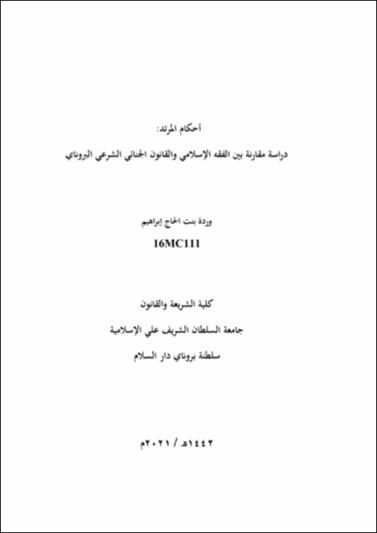| dc.contributor.author | Wardah binti Haji Ibrahim | |
| dc.date.accessioned | 2021-06-07T00:58:00Z | |
| dc.date.available | 2021-06-07T00:58:00Z | |
| dc.date.issued | 2021 | |
| dc.identifier.uri | https://e-ilami.unissa.edu.bn:8443/handle/20.500.14275/4158 | |
| dc.description.abstract | Apostasy is one of the great sins that need to be addressed. This research aims to consider and compare the apostasy in Islamic law with Brunei's Syariah Penal Code Order. In terms of legislation, this study covers four legal sects. As for the law, it covers Syariah Penal Code Order (2013), Islamic Religious Council and Kadis Court and Syariah Criminal Procedure Code (2018). This research is based on descriptive analysis methods, and consists of two parts: one: the study in theory, and the second: the statistical study of apostate cases in Brunei Darussalam from 2010-2019. The research concluded that cases of apostasy were - mostly - related to Muslims (Mualaf) who were converts to Islam for marriage purposes, and after the failure of the marriage and divorce, the woman decided to return to her family and her old religion. The investigation also concluded that although Syariah Penal Code Order decrees the death penalty for apostasy by conviction or witness testimony, the court has the power to keep the door of repentance open. | en_US |
| dc.language.iso | Arabic | en_US |
| dc.publisher | Universiti Sultan Sharif Ali | en_US |
| dc.subject | Apostacy | en_US |
| dc.subject | Islamic Jurisprudence | en_US |
| dc.title | أحكام المرتد: دراسة مقارنة بين الفقه الإسلامي والقانون الجنائي الشرعي ال بوناي | en_US |
| dc.title.alternative | Apostacy: A Comparative Study between Islamic Jurisprudence and Syariah Penal Code Order | en_US |
| dc.type | Thesis | en_US |
| dc.faculty | Faculty of Shariah and Law | en_US |
| dc.additionalinformation | Page Number: 147 Pages | en_US |
| dc.supervisor | الأستاذ المشارك الدكتور نعمان جغيم | en_US |
| dc.studentID | 16MC111 | en_US |
| dc.keyword | Hukum Murtad | en_US |



